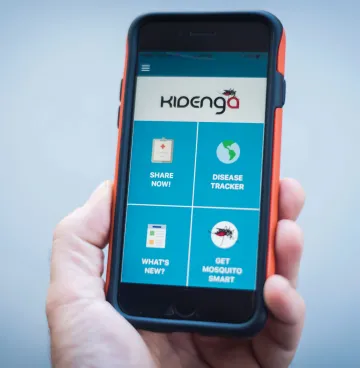Citizen Science
UA develops self-reporting app for tracking mosquito-borne illnesses
A notification pops up on the smartphone screen.
It reads: “Report Now – Help Track Zika!”
The Kidenga app opens and asks what symptoms the user may have experienced and whether they noticed any mosquitos in the area over the past week. The screen shows a map of the Miami area and whether there are any confirmed cases of mosquito-borne illnesses.
The reporting process takes less than 10 seconds and is completely anonymous.
Behind the scenes, the reported data is sent to Kacey Ernst, an associate professor in the Mel and Enid Zuckerman College of Public Health, who records the data and monitors any significant changes. If she finds growing clusters of related symptoms, Ernst can trigger a closer investigation by local health department officials.

The Kidenga app has been funded by grants of $200,000 from the Skoll Foundation and $65,000 from the Centers for Disease Control and Prevention. It launched on the Apple and Google app stores in September 2016.
Ernst says her team is still in the early phase of the project. In the coming months, they will promote the app to increase participation, which will help validate the data.
“Once we have more people using the app, we can help our health department and the Centers for Disease Control partners do their job of detecting and responding to mosquito-related outbreaks,” Ernst says.
Heather Venkat, acting state public health veterinarian for the Arizona State Department of Public Health, serves in an advisory role for the project.
She says the Kidenga app is another surveillance method that helps monitor symptoms of three commonly spread mosquito-borne viruses: Zika, dengue and chikungunya.
Since 2015, there have been more than 5,400 reported cases of Zika in the U.S., with a majority of cases occurring in travelers returning from affected areas, according to the Centers for Disease Control and Prevention. A Zika infection can cause birth defects and, though relatively rare, neurological problems that weaken arms and legs.
“We are always actively looking for these diseases so that we can respond and deal with them accordingly,” Venkat says. “So we work closely with partners like the University of Arizona because we need the extra manpower and expertise to help expand our capacity.”
